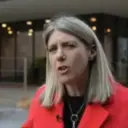Hospital opened 'incident room' to review child deathspublished at 14:30 BST 10 September 2024
 Judith Moritz
Judith Moritz
Reporting from the inquiry
Attention now turns to when consideration was given to reporting Letby to police. The first recorded mention of involvement of the police, that the inquiry has been able to identify so far, appears on 29 June 2016.
Langdale says "we will be looking closely at whether this possibility was raised earlier and why, even after it was raised in June 2016, it was not taken forward for nearly a year.”
The inquiry learns that on 4 July 2016, the director of nursing, Alison Kelly, notified the Nursing and Midwifery Council that a registered nurse - Lucy Letby - “may present a serious risk to public safety although no evidence is available at this time.”
Rachel Langdale KC says “what is clear from the evidence gathered to date is that during a number of meetings over the 27 -30 June 2016 contacting the police was discussed. However, the decision of the senior managers appears to have been not to approach the police at this stage, but rather to commission reviews in the neonatal unit and inquire into the circumstances of the deaths on the unit.”
The inquiry is told that, in July 2016, the hospital opened its own ‘incident room’ to look at the deaths, and established something called ‘Silver Command’ - meetings were held in the morning and evening to take stock of what was being done.
